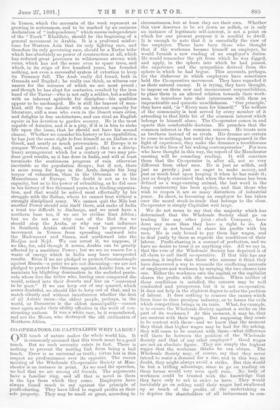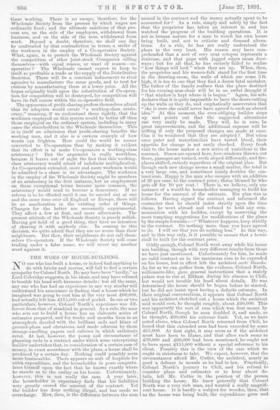CO-OPERATORS, OR CAPITALISTS WRIT LARGE P O NE touch of nature
makes the whole world kin. It is commonly assumed that this touch must be a good touch. But no such necessity exists in fact. There is nothing to prevent the uniting link from being a bad touch. Error is as universal as truth; virtue has in this respect no predominance over its opposite. The recent meeting of the Wholesale Co-operative Society at Man- chester is an instance in point. As we read the speeches, we feel that we are among old friends. The arguments have a familiar ring, and all that is novel in them is the lips from which they come. Employers have always found much to say against the principle of profit-sharing. They have liked to regard profits as their sole property. They may be small or great, according to circumstances, but at least they are their own. Whether this view deserves to be set down as selfish, or is only an instance of legitimate self-interest, is not a point on which for our present purpose it is needful to dwell. It is enough to note that it is essentially the view of the employer. There have been those who thought that if the workman became himself an employer, he would furnish a new reading of an employer's duties. He would remember the pit from which he was digged, and apply, in the sphere into which he had passed, the experience and the sympathies derived from the sphere in which he had begun. This accounts, perhaps, for the disfavour in which employers have sometimes held the Co-operative movement. They have regarded it as their natural enemy. It is trying, they have thought, to impose on them new and inconvenient responsibilities, to place them in an altered relation towards their work- men, to introduce into their intercourse with them an impracticable and quixotic unselfishness. 'Our principle,' they have said, 'is "Every man for himself." The welfare of the community is best served by every member of it attending to that little bit of the common interest which belongs to himself alone. The Co-operator comes in and upsets this comfortable doctrine. He preaches that the common interest is the common concern. He treats men as brethren instead of as rivals. His dreams are certain to come to nothing, but until they have disappeared in the light of experience, they make the dreamer a troublesome factor in the lives of his waking contemporaries.' For men who have thought in this way, the report of the Manchester meeting will be consoling reading. It will convince them that the Co-operator is, after all, not so very different from other men. He is just as selfish, and just as greedy ; just as eager to make money, and just as much bent upon keeping it when he has made it ; just as deeply convinced that when the workman has been defined as a wage-earning animal, the last word in the long controversy has been spoken, and that those who wish to reopen it are so many disturbers of industrial peace. In short, in becoming an employer he has taken over the moral stock-in-trade that belongs to the class. Co-operator is simply Capitalist writ large.
We do not mean to say that the majority which has determined that the Wholesale Society shall go on trading like any other joint - stock Company, have done any more than they have a right to do. An employer is not bound to share his profits with his men. He is only bound to pay them fair wages, and to deal justly by them as regards the conditions of their labour. Profit-sharing is a counsel of perfection, and we have no desire to treat it as anything else. All we say is, that the vote of the Wholesale Society has deprived it of all claim to call itself co-operative. If that title has any meaning, it implies that those who assume it think they have discovered a way to reconcile the conflicting interests of employers and workmen by merging the two classes into one. Either the workmen own the capital, or the capitalist shares the profits with the workmen. When neither of these conditions is satisfied, the concern may be well conducted and prosperous, but it is not co-operative. It does not help in the slightest degree to solve the problem of labour. It does nothing to remove the causes which from time to time paralyse industry, or to lessen the evils which competition brings in its train. What, for example, is to ensure the Wholesale Society against a strike on the part of its workmen ? At this moment, it may be, they are content with their wages. But supposing they cease to be content with them—and we know that the moment they think that higher wages may be had for the asking, they will cease to be content with them—what difference will there be between the position of the Wholesale Society and that of any other employer ? Good wages are not an absolute figure. They are simply the highest wages that the workman thiuks he can obtain. The Wholesale Society may, of course, say that they never intend to resist a demand for a rise, and in this way, no doubt, they might always avoid a strike. But this would be but a trifling advantage, since to go on trading on these terms would very soon spell ruin. No body of workmen could be trusted with the knowledge that they have only to ask in order to have. They would inevitably go on asking until their wages had swallowed up so much of the profits of the undertaking as to deprive the shareholders of all inducement to con- tinue working. There is no escape, therefore, for the Wholesale Society from the process by which wages are ordinarily fixed ; and the ultimate sanctions of that pro- oess are, on the side of the employers, withdrawal from business, and on the side of the men, withdrawal from work. Beyond a doubt, therefore, we shall one day be confronted by that contradiction in terms, a strike of the workmen in the employ of a Co-operative Society. What, again, is to protect the Wholesale Society against the competition of other joint-stock Companies calling themselves—with equal reason, or want of reason—co- operative ? The Wholesale cannot expect to keep to itself so profitable a trade as the supply of the Distributive Societies. There will be a constant inducement to rival agencies to manufacture the same goods, and to tout for custom by manufacturing them at a lower price. All the hopes originally built upon the substitution of Co-opera- tion for competition will be destroyed, for competition will have its full course within the co-operative field. The opponents of profit-sharing profess themselves afraid that its adoption would create "a working-class aristo- cracy," meaning, if we understand them rightly, that the workmen employed on this system would be better off than those employed on the ordinary system, including in many cases the shareholders in the Wholesale themselves. This is in itself an admission that profit-sharing benefits the working man, and it also is a curious example of how words can frighten. How could the world be sooner converted to Co-operation than by making it evident that its effect is to make Co-operators a working-class aristocracy ? But the argument is really worthless, because it leaves out of sight the fact that this working- class aristocracy would admit of indefinite multiplication. As Co-operation extended, more and more workmen would be admitted to a share in its advantages. The workmen in the employ of the Wholesale Society might be members of an aristocracy in the first instance, but as employment on these exceptional terms became more common, the aristocracy would tend to become a democracy. If no reform is to be effected until it can be carried out at one and the same time over all England or Europe, there will be no amelioration in the existing order of things. Changes for the better are necessarily experimental. They affect a few at first, and more afterwards. The present attitude of the Wholesale Society is purely selfish. Having got hold of a good thing, they have no intention of sharing it with anybody else. In coming to this decision, we quite admit that they are no worse than their neighbours. But then, their neighbours do not call them- selves Co-operators. If the Wholesale Society will cease trading under a false name, we will never say another word against it.



































 Previous page
Previous page